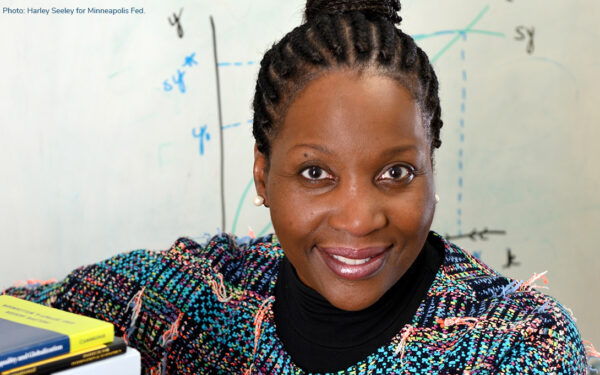In another historic confirmation and with a slim victory, the U.S. Senate has confirmed the first Black woman to serve on the Federal Reserve Board of the Federal Reserve System.
Lisa D. Cook, an economist, is the first Black woman to serve on the board in its 108-year history, according to the NBC News. The Federal Reserve Board plays a key role in setting the central bank’s monetary policy.

Cook was confirmed by the Democratic-led Senate in a 51 to 50 vote, with the tie-breaking vote being cast by Vice President Kamala Harris, the first Black person to serve in her political capacity.
After the former administration left a vacancy on the Federal board, President Joe Biden nominated three individuals he believed were qualified to support the country’s needs during a complicated downturn in the economy.
On Jan. 22, the White House announced the nomination of Sarah Bloom Raskin to serve as Vice-Chair for Supervision of the Board of Governors of the Federal Reserve System and nominated Cook and Philip Jefferson to serve on the Board of Governors of the Federal Reserve System. Both Cook and Jefferson are Black.
The POTUS said in a statement about his choice, “… Jefferson and Cook are talented economists with decades of experience working on a broad range of economic issues. Together with Chair Powell and Dr. Brainard, who I renominated last month, this group will bring much-needed expertise, judgment, and leadership to the Federal Reserve while at the same time bringing a diversity of thought and perspective never seen before on the Board of Governors.”
The statement continued, “They will continue the important work of steering us on a path to a strong, sustainable recovery while making sure that price increases do not become entrenched over the long term. I have full confidence in the strong leadership of this group of nominees, and that they have the experience, judgment, and integrity to lead the Federal Reserve and to help build our economy back better for working families.”
An economics and international relations professor at Michigan State University, Cook was elected to the Federal Reserve Bank of Chicago’s board of directors. During the Obama administration, she also served on the White House Council of Economic Advisers; additionally, Cook was a member of the Biden transition team.
Cook has done extensive research on how hate-related violence has harmed U.S. economic growth by examining the American economic history, macroeconomics, international finance and racial and gender disparities among workers in innovation-related fields.
The economist is a member of the National Bureau of Economic Research, working on two major programs: Development of the American Economy and Productivity, Innovation, and Entrepreneurship. She will resign from this organization when she takes on her new appointment.
The confirmation was contentious as both sides had strong opinions on Cook’s qualifications, particularly because of her research, political statements and history.
Sen. Patrick Toomey, a Republican from Pennsylvania, painted the Georgia native as being a left-wing political figure with no desire to work with opposing sides.
He also said he lacked confidence in her monetary policy experience, saying, “Since we know very little about her views on inflation, my grave concern is that Professor Cook will serve as an inflation dove on the Fed at a time when American families continue to be ravaged by these price increases.”
An ally from her home state, Sen. Raphael Warnock, disagrees and believes she has what it takes to be successful in the position, calling her “eminently qualified for the position.”
President Biden has worked to diversify his administration, surrounding himself with Black people on his staff, nominations, and appointments.
The Joint Center reports during the first 100 days, out of the approximately 1,500 agency appointments “18% identify as Black or African American,” including historic firsts in positions like the Vice President, Defense Secretary, Council of Economic Advisers Chair, five Black deputy secretaries, and three Black women appellate judge nominees.
At that time, a quarter of his cabinet was African American.
In March 2022, Biden’s U.S. Supreme Court nominee Ketanji Brown Jackson became the first Black woman to sit on the highest court of the land. Jefferson, confirmed on May 12 by the U.S. Senate, becomes the fourth Black man to serve on the Federal Reserve Board.
Moments after the votes, a White House official remarked, “President Biden said today, addressing inflation remains a top priority of the Biden-Harris Administration, as we work to lower costs for hardworking families.”
“It is important to have a fully-staffed Federal Reserve who can take on these challenges for the American people.”


